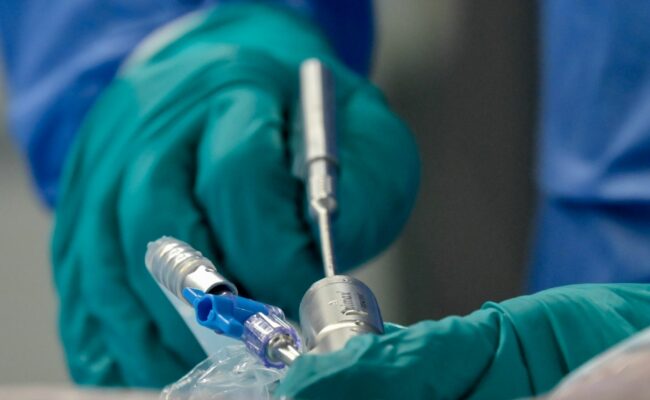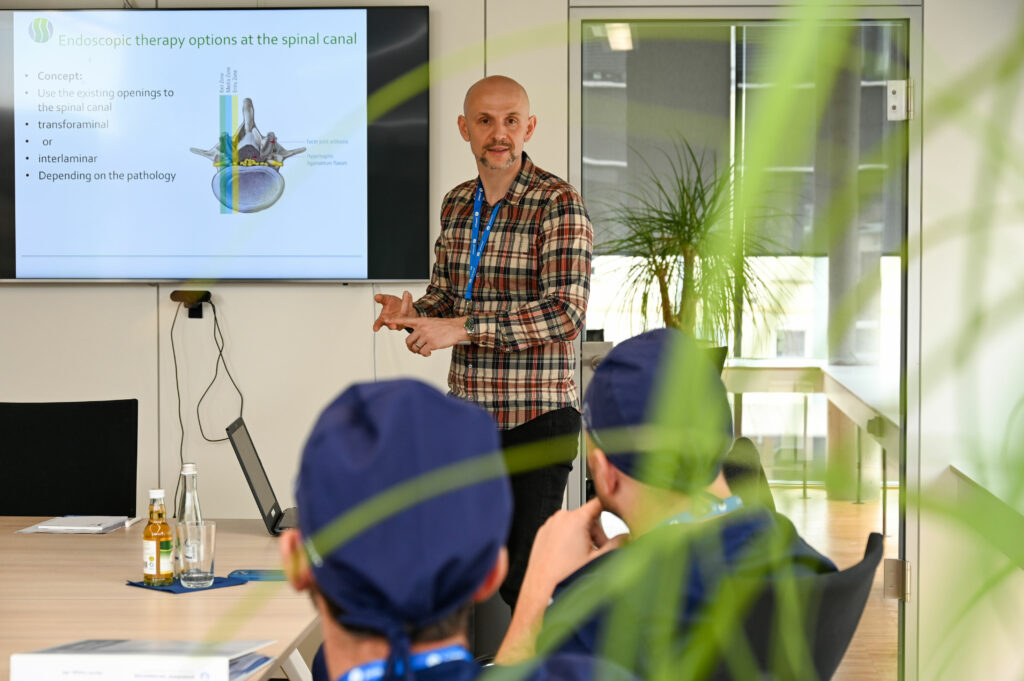Herniated Disc Treatment
Most back pain without nerve root symptoms typically responds well to conservative methods of treatment. However, if severe pain and neurological symptoms, associated with impairment of nerve function, cannot be brought under control with conservative solutions (e.g. physiotherapy, back exercises, analgesics) a neurological examination (e.g. of the central nervous system) is usually carried out, and surgery is considered.
Indications for Surgical Intervention
Most herniated discs in the lumbar spine respond well to conservative treatment (e.g. with mild painkillers, physiotherapy). However, in the case of certain symptoms such as paralysis due to nerve root compression or persistent radicular (radiating) pain despite conservative treatment, disc surgery is a necessary treatment option. This is because persistent pain can become chronic if it is not treated or not treated properly.
In addition to persistent pain, there is also an increased risk of irreversible nerve damage, which tends to worsen the chances of recovery. Ultimately, endoscopic spinal surgery may be the best option for treating the problem.

Indications for Surgical Intervention
Most herniated discs in the lumbar spine respond well to conservative treatment (e.g. with mild painkillers, physiotherapy). However, in the case of certain symptoms such as paralysis due to nerve root compression or persistent radicular (radiating) pain despite conservative treatment, disc surgery is a necessary treatment option. This is because persistent pain can become chronic if it is not treated or not treated properly.
In addition to persistent pain, there is also an increased risk of irreversible nerve damage, which tends to worsen the chances of recovery. Ultimately, endoscopic spinal surgery may be the best option for treating the problem.


Endoscopic disc surgery with the joimax® approach
Various surgical options for treating a herniated disc are used: from open surgery to microsurgery and minimally invasive endoscopic surgery. Ultimately, all methods have the same target: to remove the prolapsed disc material that has leaked into the spinal canal and to find or eliminate the cause of pain.
Compared to conventional methods, endoscopic spine surgery is the least invasive option as the surgeon does not have to cut through muscle tissue and only makes a 7 mm incision to reach the pathology.
Endoscopic disc surgery with the joimax® approach
Various surgical options for treating a herniated disc are used: from open surgery to microsurgery and minimally invasive endoscopic surgery. Ultimately, all methods have the same target: to remove the prolapsed disc material that has leaked into the spinal canal and to find or eliminate the cause of pain.
Compared to conventional methods, endoscopic spine surgery is the least invasive option as the surgeon does not have to cut through muscle tissue and only makes a 7 mm incision to reach the pathology.

Advantages of the endoscopic method
The minimally invasive endoscopic approach enables extensive protection of all stabilizing structures, ligaments, muscles and bones and minimizes damage to the soft tissue around the spine. The faster recovery and shorter postoperative hospital stay allow an earlier return to everyday life.
In addition, the risk of infection is lower with endoscopic procedures as compared to open surgery.
Advantages of the
endoscopic method
The minimally invasive endoscopic approach enables extensive protection of all stabilizing structures, ligaments, muscles and bones and minimizes damage to the soft tissue around the spine. The faster recovery and shorter post-
operative hospital stay allow an earlier return to everyday life.
In addition, the risk of infection is lower with endoscopic procedures as compared to open surgery.

More Information
Download our patient brochure right here!
More Information
Download our patient brochure right here!

Contact and Clinic Finder
Do you need help to find a clinic using the joimax® methods? Feel free to contact us!
Patients' Testimonials
Have a look at patients’ reports about their experience of endoscopic disc surgery with the TESSYS® system!


